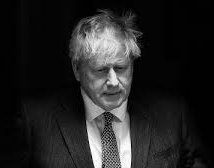The British fashion industry has had little support from Boris Johnson's government. Brexit, Covid-19 and the Tories’ internal quarrels have distracted the government and inhibited its ability to invest in the £26 billion fashion industry and the £48 billion luxury industry. With Johnson's resignation and a new cabinet, the brands told Vogue Business that they hope for a more stable government and more investment in sustainability, innovation and building a circular fashion economy.
Johnson campaigned for and implemented Brexit, ended tax-free shopping for tourists and led a rocky path through Covid-19. British fashion executives tell Vogue Business what they need now as Johnson’s replacements line up after today’s resignation.
Johnson narrowly survived a vote of no-confidence last month following a series of scandals including rule-breaking parties during lockdown, but today, after a stream of cabinet resignations including chancellor Rishi Sunak and health secretary Sajid Javid, Johnson agreed to step down as PM once a new Conservative Party leader was agreed.
The British fashion industry has seen lower levels of support from the UK government under Johnson’s rule. Industry sources say Brexit, Covid-19 and internal party politics have distracted the government and inhibited its capacity to invest in the £26 billion fashion industry and the £48 billion luxury industry. With Johnson’s resignation and a new cabinet, brands told Vogue Business they are hoping for a more stable government and are keen for greater investment in sustainability, innovation and building a circular fashion economy. Top of mind is also reinstating tax-free tourist shopping, which many argue is slowing industry growth compared with Europe. However, doubts remain whether a new government will go against previous legislation.
“All the internal issues that have consumed the party in [Johnson’s] resignation have been a great distraction from the real needs of business. I’m hoping that [the resignation] will be a reset,” says Helen Brocklebank, chief executive of British luxury trade body Walpole. “The distraction of the personal politics around Boris Johnson has not been helpful [for Britain’s luxury sector],” Walpole has repeatedly called for for the reintroduction of tax-free tourist shopping — a plea that Brocklebank is hoping new chancellor Nadhim Zahawi will be more open to than Sunak, who scrapped it starting January 2021.
Others went further. “Fundamentally, we need certainty, and we haven’t had that for a long time under Johnson,” says Tamara Cincik, founder and CEO of thinktank Fashion Roundtable. Johnson’s government will be remembered for reducing the already-strained civil service; jeopardising a smooth Brexit with its strategy on Northern Ireland; and threatening creative industries by pursuing science, engineering, and technology-based education without including the arts and creative education.
“The fashion sector is full of talent and opportunity, but the focus on STEM education means less diverse talent coming up the chain, and few policymakers who understand the industry or its value,” she explains. Cincik would like to see Johnson’s successor prioritise creative education, the reinstatement of tax-free shopping, and more investment into the circular economy.
“In May, 250 luxury brands urged the UK government to reintroduce tax-free shopping.”
The British Fashion Council noted the “challenges” faced by the industry during his tenure including Brexit, Covid-19, the “need to reinstate tax-free shopping, as well as addressing the need to be more sustainable, equitable and diverse and the global power of our fashion businesses that represent a modern and forward-thinking”. Only a month ago, Johnson hosted a reception with BFC at Downing Street to celebrate the BFC’s 10-year industry-led Industrial Change Programme to support the transition to a circular fashion ecosystem (as part of the BFC’s Institute of Positive Fashion). At the meeting, Johnson promised £80 million in funding, though this was not confirmed. Today, BFC CEO Caroline Rush says: “This will need industry, academia and government, regardless of party politics.”
The UK Fashion & Textile Association (UKFT) is also pushing for a rethink on Brexit. “I hope that we will go through a process fairly quickly where we have a government in place which is able to have a long, hard, and honest look at Brexit,” says Paul Alger, UKFT’s international business director. “The UK’s trading relationship with the EU is clearly not working.”
Supporting UK companies with grants, and reversing the Treasury’s removal of VAT refunds are key areas the incoming prime minister needs to address, urges Alger. The decision to remove VAT refunds has the potential to “damage our economy beyond all measure”. He says: “It can’t be right for the UK or any European country not to use the VAT refund scheme to drive people coming to our country to spend money in our retail stores.”
“We've got a great story in the UK to tell,” says Alger. “But, the policies are heading in the wrong direction. This is an opportunity to reset those policy decisions and make better ones.”



